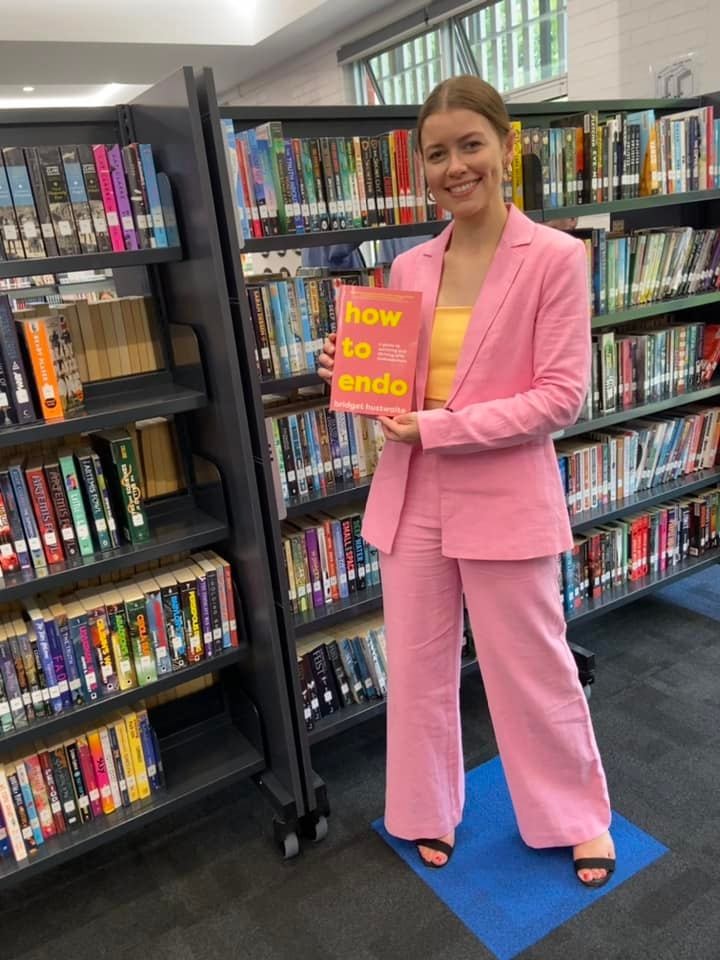How to Endo with Bridget Hustwaite
Published on 03 March 2022

Triple J presenter, Bridget Hustwaite, was suffering from an invisible illness. After years of dismissive doctors and misinformation, Bridget finally received a diagnosis for her intensely heavy periods, pulsing headaches and excruciating abdominal pain—endometriosis.
In her new book How to Endo, Bridget unpacks how to survive and thrive when dealing with a chronic illness. Her book is for everyone on the endo spectrum: the battle-hardened warriors, the newly diagnosed and those still searching for answers.
Bridget is sharing her story as part of an author talk at Croydon Library on Saturday 12 March, 11am to 12 noon.
In the lead up to the event, we sat down with Bridget and discussed everything endo, her book and Endogram. Visit the library’s event webpage to book your space.
When were you officially diagnosed with endometriosis?
I was officially diagnosed in 2018 via laparoscopic excision surgery. That year I had moved from Ballarat to Sydney and decided that I really needed to get on top of the pain I was experiencing and thankfully I found a women’s health doctor who not only took me seriously but could not believe that I had been enduring all of these symptoms for so long. Twelve years of pain!
How has endometriosis impacted your life?
It’s impacted my life in so many ways. Beyond the physical pain, I have felt significant financial pressure due to ongoing costs for managing my endo (through surgery, scans, pelvic physio sessions, pain relief etc). I think it’s really impacted me mentally as well. For so long I was made to feel like what I was experiencing was normal—it made me really question my strength and I suppose my sanity. Was it all in my head? Turns out it wasn’t. But twelve years of dismissal can make you doubt yourself. It has definitely taken a toll on my social life, feeling like I am missing out on things and worrying that people wouldn’t understand why I would have to say no a lot. Life with an invisible illness can be really challenging.
What was the turning point that made you start Endogram?
Following my diagnosis in 2018 and sharing my story on Triple J, I was constantly receiving message after message from others who either had endo or were still searching for answers. Not to mention messages from their partners, friends and family. I wanted to continue the conversation but felt like it needed its own dedicated space, so I decided to launch an Instagram account. My mum came up with the name and I set out to create a visually striking page with eye catching graphics and informative, relatable captions. Next thing you know, endogram has over 44k followers, it led me to the creation of How to Endo and personally, has introduced me to some amazing people who I now consider some of my closest friends.
What would you say to someone suffering from endometriosis who is considering excision surgery?
Firstly, I would give them a virtual high-five because excision surgery is the gold standard of detecting and diagnosing endometriosis. I would encourage them to ask as many questions as they need and take notes in every consultation they have with their specialist. I would also recommend my book! I have a whole chapter on surgery and recovery with tips on what to pack and how to make your recovery as smooth as possible. If I had a book like mine when I was heading into my first surgery, I would have felt so much more prepared and at ease!
What are your top tips for surviving the terrible pain of endo?
Personally, heat is my best friend when it comes to managing my pain. Whether it’s a long bath or a heat pack, it’s my first go-to. And rest! Rest is so important. Too often we feel guilty for resting but it is so imperative for our wellbeing, especially with a chronic illness.
What made you want to write a book about your experience?
It’s no secret that there’s been a lack of resources for endometriosis and I felt like something was missing in terms of a book that was informative, easy to read, inclusive and dare I say, fun. I wanted to provide the ‘ins and outs’ of this condition but in a way that felt super relatable. I’m really proud of the final result and am so thankful to the numerous people who contributed.
What was the most challenging part about writing your book?
Honestly, the juggling act of researching and writing whilst still working full time! I’m lucky in the sense that lockdown did provide more free time but never underestimate how much goes into the creation of a book. I also didn’t enjoy the more tedious things like referencing, but I honestly don’t think I know anyone who enjoys doing that!
What do you hope readers get out of your book?
I hope it brings them comfort and understanding. I hope readers feel empowered with what they have learned, and I hope it can help them on their own endo journey. I also hope their loved ones feel more confident in how they can provide support to someone with endometriosis.
Don’t miss Bridget’s author talk at Croydon Library this Saturday 12 March, 11am to 12 noon. Visit the library’s event webpage to book your space.
